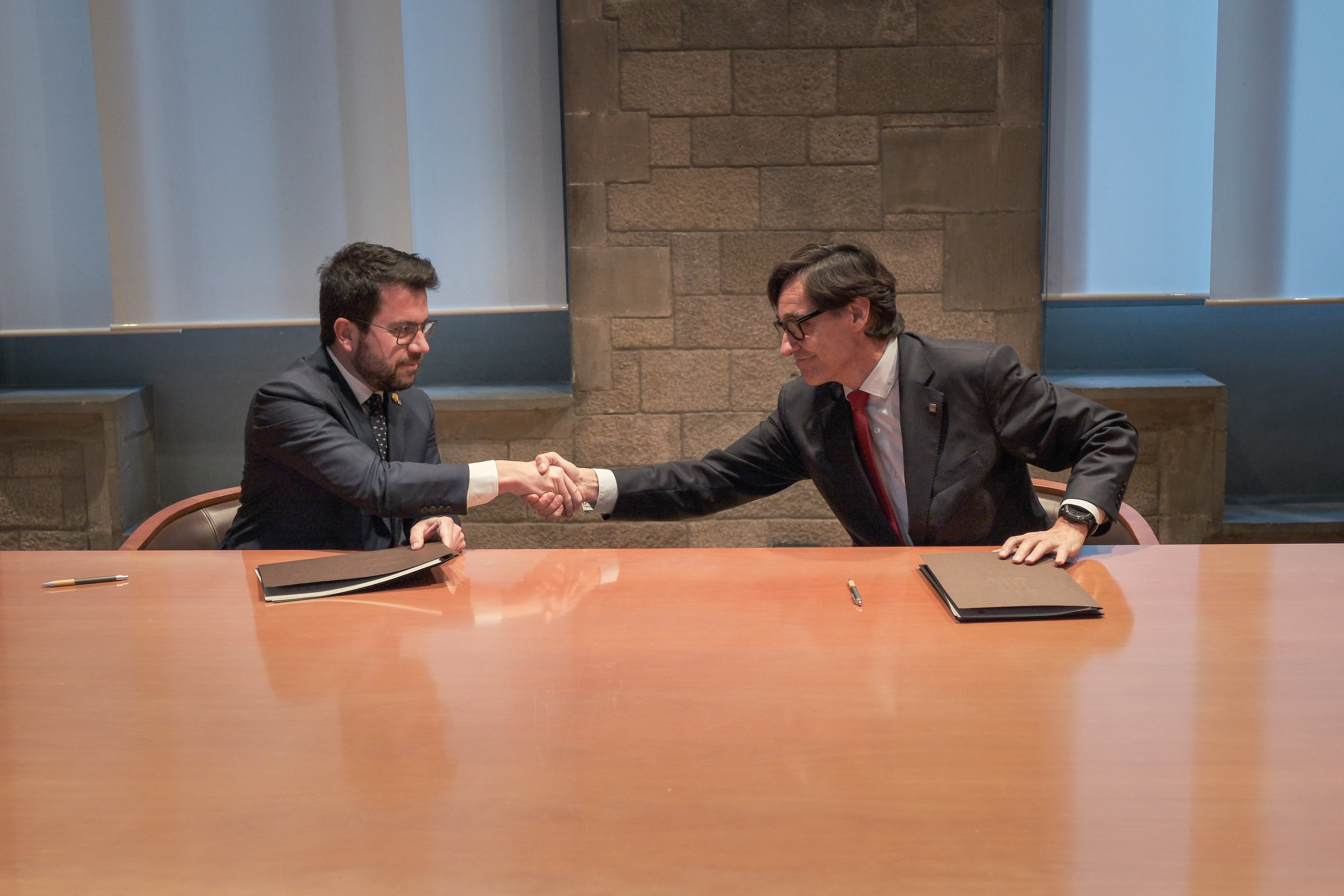The Catalan government has finally managed to reach an agreement for the 2023 budget with the Catalan Socialists (PSC) this Wednesday. The Catalan president, Pere Aragonès, and the head of the opposition, Salvador Illa, signed the deed at the Palau de la Generalitat a few minutes before five in the afternoon. The agreement has been made public after weeks of negotiations, which have intensified in recent days, following the concession made by the Catalan Republican Left (ERC) government to the PSC demand over the B-40 highway. With the votes of the 33 Socialist deputies, Aragonès now has an absolute majority in Parliament awaiting the budget bill, which will be sent to the house once it is formally agreed by a special cabinet meeting. This week's negotiation took place in almost total secrecy, with few details having leaked out. What both parties have revealed are the marathonian meetings that were held (Monday morning and afternoon, Tuesday in the middle of the day followed by contacts in the afternoon) to try to unblock the 2023 budget.
What does the deal include?
The government and the PSC have reached a budget agreement for 2023, which consists of two documents: one of 26 pages referring to strictly budgetary measures and another of three pages that includes the commitments to promote "major infrastructures of the country", which the Socialists stipulated as necessary for the deal, such as the Hard Rock leisure centre in the Camp de Tarragona, the construction of the Ronda Nord (B-40), the "modernization" of the Barcelona-El Prat airport and improvements to the Rodalies, the Renfe-run suburban trains around the Catalan cities
Regarding the Ronda Nord, which was the major stumbling block in recent weeks during the negotiation, the Government and the Socialists have agreed to put into effect, within the first quarter of 2023, with the Spanish ministry of transport, the agreement and financing accord that guarantees the drafting of the project. With regard to the Hard Rock centre, the document indicates that during 2023 the processes related to the start of the consortium's plan for the centre will be completed. With respect to the airport, the Catalan executive and the Socialists have declared that, during this year, they will agree with the Spanish government on a technical commission to address the new airport model that Catalonia needs to transform the airport. Finally, a proposal is made for a Rodalies suburban train service managed from Catalonia, a change that involves reaching a deal with the Spanish government on the model to transfer the financial resources that are needed to adapt the Rodalies management to the railway services that are already run by the Catalan government, through the FGC.
A three month negotiation
After the collapse of the Catalan pro-independence coalition last October, ERC took on the responsibility of negotiating the budget for 2023 with the rest of the parliamentary groups, highlighting the work done up until then by outgoing Junts minister Jaume Giró. But the first contacts were brief and spread over the calendar, without haste. In addition, initially, the Pere Aragonès executive dismissed the PSC as a priority partner and focused its attention on En Comú Podem under Jéssica Albiach, as well as there former partners in Junts. As the weeks went by, contacts accelerated, and it was on December 14th that the government and Albiach's party were able to announce an agreement to approve the accounts at the Palau de la Generalitat. But the 33 deputies of ERC and the 8 of the Commons were insufficient: it was still necessary to gather the support of at least one of the main groups in the chamber.
With the PSC already immersed in negotiations, communication with Junts cooled. An understanding seemed imminent with the arrival of the new year, but the days went by and relations became toxic: while PSC leader Salvador Illa reaffirmed his demand for the three macro-projects (the B-40, the Hard Rock project and the expansion of the airport), the executive tried to avoid them by announcing that there was already an agreement on the rest of the Socialist demands. Without concessions by either player, negotiation seemed likely to stall. Then, Aragonès decided to accept the lesser evil and gave way on the B-40 in the first parliamentary plenary of the year, "assuming the contradictions", to thus put pressure on opposition leader Illa so that he had no excuses left. In fact, the PSC still managed to delay the negotiations for a few more days, but with this obstacle overcome, the agreement finally materialized. Now all that remains is the parliamentary processing.

